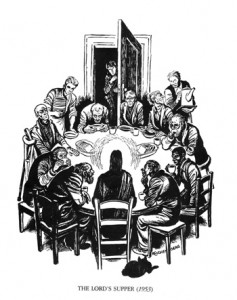Peter Maurin must be smiling.
Pope Francis has announced a startling new way forward for the whole church. When we think of big changes in the church, we think of shifts in theology like Vatican II or in terms of stances on major issues. But Francis’ dream of a church is ultimately transformation, and his goal is more fundamental and likely more impactful. He wants to not necessarily change what the Church thinks. He wants to change how the Church thinks.
Pope Francis is calling for a synodal church which calls for gathering and hearing closely all the people. A synodal Church seeks the Gospel and how it is heard and spoken among all communities. A synodal Church gathers people and pays close attention to the sensus fidelum (the sense of the faithful) and does not dismiss it as uninformed or unworthy. A synodal Church patiently listens and does not jump to correct. A synodal Church pays special and intentional awareness to those whom Jesus found most interesting—the poor, the marginalized and the dismissed – those whom Francis identifies as the fringes of society, and places them in the heart of the Church.
I am moved as always by Francis’ use of biblical imagery. He notes the most common scenes in the Gospels include Jesus, the apostles and the crowd who ask questions, flock to hear him and beg for their pain to be eased. In promoting the new way, Francis wants all those elements represented on every level of the Church. The authentic voice of the truth, Jesus Christ. The proper and necessary authoritative role of leadership and the animating and life-giving spirit of the crowd. Without all three groups represented, the Church is not whole. It does not take a theologian to discover which of those voices Francis has found missing. A Church that dictates without listening is not grounded in the life and among the people which shaped Jesus’ ministry.
This is great news. It is great news even if you are a diocesan official helping with the daunting task of establishing a synodal way in the diocese, among various regions, in each parish and among those who are on the fringes and have even left the Church. (I am not asking for sympathy, well maybe a little, but mostly prayers!) Then I remember that I have a friend in Peter Maurin. As he always believed in his relentlessly hopeful heart the Church might just be catching up to him for Synodality sounds a like a Roundtable.
From literally the beginning of the Catholic Worker, as in the day Peter met Dorothy, Roundtables, where scholars and workers would come together to discuss the issues of the day, have been at the center of the movement. The hope was that the workers would ground the scholars in real life and the scholars would lift the sights of the workers. As Maurin wrote in an Easy Essay, “We need Round-Table Discussions to learn from scholars how a path can be made from things as they are to things as they should be.” A synodal Church will first seek to find how things are: for/with the poor, minorities, immigrants from Latin America, LGBTQ Catholics, those who have left the Church and those still in the pews. Without listening with a Christ-like ear, how shall we go from how things are to things as they should be?
The Catholic Worker movement has been more known for what it has said and what it has done. But its founders would have thought their powerful words and life-saving actions rang hollow if they had not first listened to Christ disguised as the poor. This synodal process, meant to be a part of every parish and to include every voice, will change the face of the Church not in the most “newsworthy” ways. It will change its nature by engaging all the people; by listening to those who have been shunned and those thought to have nothing to offer; by hearing the cry of the poor and by understanding the Spirit and the wisdom of God is within each of us.
In Fritz Eichenberg’s famous wood engraving of “The Last Supper,” a typical soup kitchen crowd gathers at a round table dining room table. All have a place of equality and dignity. And every head is turned to Christ. Pope Francis is asking us to dream a Church which looks like that.
Reprinted with permission from The Albany Catholic Worker. (The author is a co-founder of Emmaus House in Albany and Pastor of St. Kateri Parish in Schenectady, NY.)\
Houston Catholic Worker, Vol. XLII, January-March, 2022.


